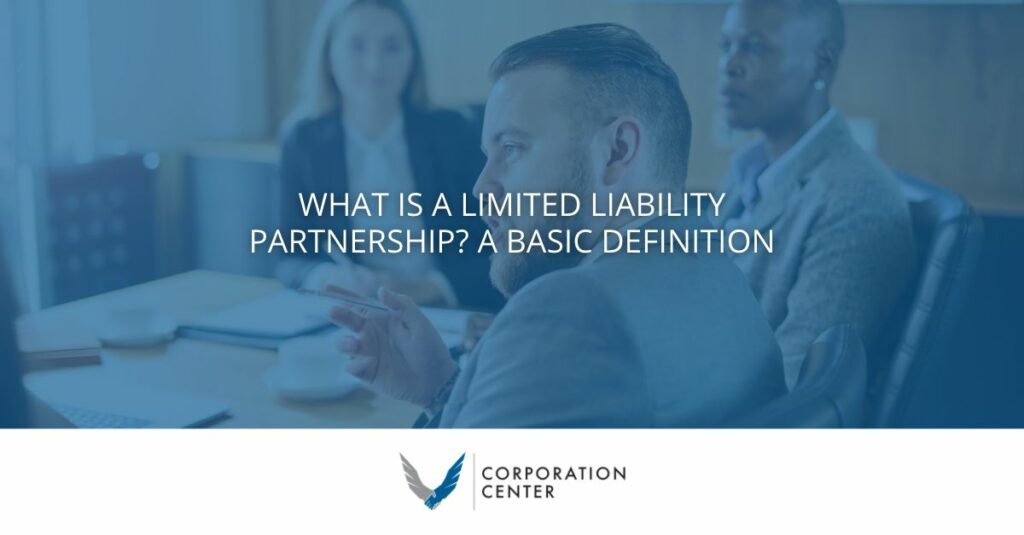After years of working for others, piling up decades of experience, you have decided to make a go of it on your own. Starting your own business can be a daunting challenge. The risks are obviously significant, but the rewards can be considerable, both financially and mentally. After all, running a successful business is a sizable accomplishment, and it is not something that just anyone is capable of doing. If you have found yourself in a position to begin an entrepreneurial adventure, there are some preliminary steps to take. One question you may want to be answered is: What is a limited liability partnership?
A limited liability partnership, often called an LLP for short, is a way in which you can structure and organize your business. If you have done all the necessary research, assembled a client list, and figured out a marketing strategy, it may be time for you, as a business owner, to learn the definition of a limited liability partnership.

An Essential Limited Liability Partnership Definition
Instead of going into business on their own, many people opt to form a joint venture with a friend or colleague. This is what is called a general partnership. Forming a general partnership can be a fairly informal process, depending on the state in which you live. Oftentimes a verbal agreement or a handshake will suffice for a basic foundation. The advantage to a partnership is that you do not have to shoulder the burden of managing a business entirely on your own.
Partnerships are especially common among professionals providing a service. Lawyers, doctors, accountants, and dentists are just some examples of businesses that are likely to include the words “partner” somewhere in their literature. What an LLP does is take an existing general partnership and add a layer of legality to the relationship.
The concept of “limited liability” means that individuals who own a business cannot be found liable in lawsuits, bankruptcy, and similar situations that may arise in their organization. For doctors and lawyers, professionals who can face malpractice suits, this is an especially prudent maneuver to pursue. An LLP is also viewed as a separate legal entity for tax purposes. The Internal Revenue Service deems these entities as “pass-through,” and as such, does not tax them as businesses.
What is the Difference Between a Limited Liability Partnership and a Limited Liability Company?
If you have seen the acronym “LLP,” odds are you have also encountered “LLC.” A limited liability company is similar to a limited liability partnership, though with some key differences. An LLC offers much more broad liability protection than an LLP. Technically, in an LLP, it is possible for one partner to be found liable, but for others to not. There is a level of accountability in place there so that negligible parties may face consequences for bad actions. In an LLC, you are not shielded from the actions of your business partners, which is something to keep in mind.
Both LLCs and LLPs share the tax benefits of “pass-through” status. That means that these businesses are not required to pay income tax on business profits, but rather what is claimed as their own income. Because these areas of the law can be complicated, it is wise to consult with a tax lawyer before forming an LLC or LLP.
In some states, such as Nevada and California, licensed professionals can only form LLPs. This is largely because of the nature of their industries where one partner’s malpractice can potentially be hugely detrimental to the business. Conversely, LLPs are not available in every state. You will want to gain an understanding of your state’s specific laws before moving forward with the creation of your business.
How Can I Form a Limited Liability Partnership Online?
If you have weighed out all of the pro’s and con’s, sat and crunched the numbers, and engaged in meaningful discussions with your business partners, you may be ready to move forward with forming an LLC or LLP. In order to do this, you will need to draw up the correct legal forms and complete them in their entirety. Once that is done, you will need to submit your documentation to your state’s Secretary of State for processing.
Since owning and operating your own business can be a uniquely time-consuming endeavor, you are probably always looking for ways to streamline redundancies. That’s not only an efficient quality to have as an individual, it can also allow you to excel as a business owner. At the Corporation Center, we recognize the value of your time. Less time spent toiling away on paperwork means more time generating revenue. With this in mind, we offer easy-to-complete online forms for establishing LLPs, LLCs, and much more. Take a moment to browse the navigation on our website–you will see that we offer fillable web forms for business documentation matters in all 50 states. Contact us today to learn more about our services.





